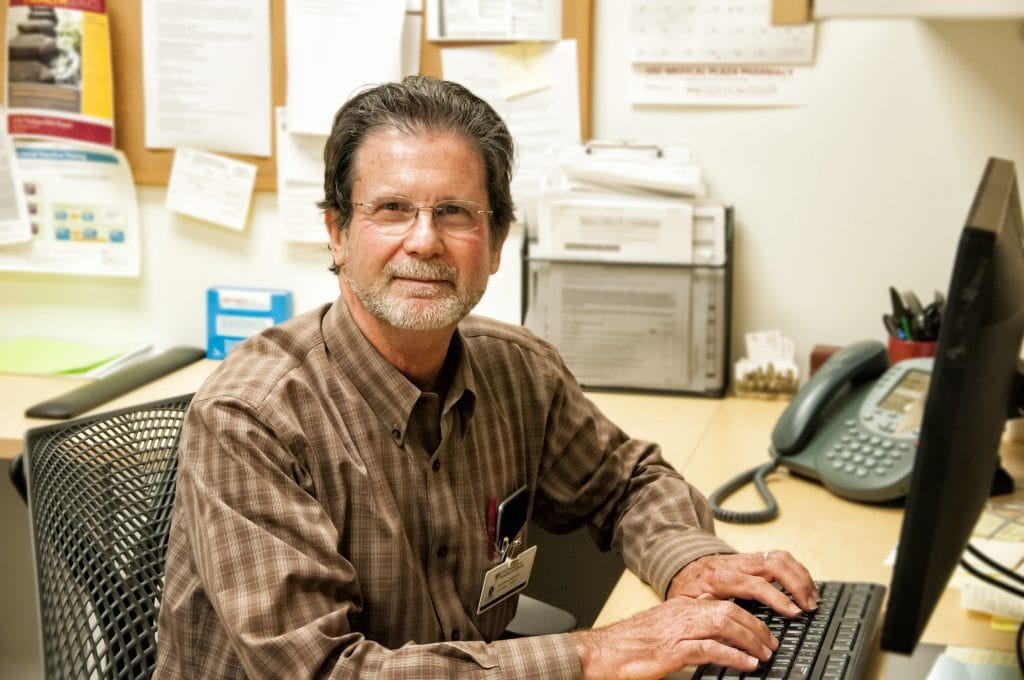Q: After you earned your PharmD from USC, you completed a residency in geriatrics and later became a board-certified geriatric pharmacist. How and when did you originally become interested in geriatric pharmacy?
A: I have always enjoyed being around older adults. As a student, I was fortunate to work with two mentors, Alan Cheung and John Thompson, who were pioneers in the emerging field of geriatric pharmacy. They encouraged me to pursue a geriatric pharmacy residency (at that time the only one in the nation). They also helped me recognize how a pharmacist could improve the health of elders by ensuring rational drug therapy.
Q: In your clinical practice, you’re part of USC’s interprofessional Geriatric Assessment Program (GAP) in Family Medicine. Can you share a bit about this program? Why is team-based care so important in serving the geriatric population?
A: There is a long history behind the GAP clinic. In the mid-1980s I became a part of an interprofessional geriatric rehabilitation team at Rancho Los Amigos National Rehabilitation Center. I had the opportunity to work with two other geriatrics pioneers, Ken Brummel-Smith, MD and Bryan Kemp, PhD, focusing on improving function in adults aging with a disability. In 2003, I followed one of our former geriatrics fellows, Laura Mosqueda, MD, to the Senior Health Center at UC Irvine to develop an integrated pharmacy practice. Two years ago, with Dr. Mosqueda coming to USC as chair of Family Medicine, we again collaborated to obtain a Geriatric Workforce Enhancement Project (GWEP) grant from the federal government. The GAP clinic, as part of the GWEP, provides a comprehensive assessment of older adults with, or at risk for, cognitive impairment. Out team of six health professions disciplines provides recommendations to the older adult’s family and primary care physician in order to maximize the person’s function and independence.
Older adults are frequently medically complex. With reduced reserve and increasing medical conditions, the choices for safe and effective treatments are reduced due to the interactions of disease and advancing age. Because each profession has its own expertise, the team-based, person-centered approach advances collaborative efforts to maximize positive outcomes and minimize risk, helping elders retain maximum function and independence.
Q: You teach an elective at USC in geriatric pharmacy practice. What is your message to pharmacy students about the effects and treatments of Alzheimer’s disease and other dementias? What lessons do you hope students will take with them as they become practicing pharmacists?
A: Alzheimer’s disease and other dementias are having an increasing impact on the health care of older adults and affect the entire family and support system. Although the search for the cause and effective treatments for Alzheimer disease has been elusive, dementia does not occur in a vacuum. There is much that the pharmacist can do, including helping to identify medications that will have the least negative impact on cognition and function, helping families and caregivers to understand the medications that their loved one is taking, and work with other health professionals to manage medications for their patients.
Q: Would you share any thoughts about the growing role of the pharmacist in helping patients and caregivers navigate Alzheimer’s disease? How can pharmacists be important allies in the care and management of Alzheimer’s disease?
A: People with dementia and their caregivers face a daunting task. A primary role of the pharmacist is to help them understand and manage all of their medications. People with dementia are not able to reliably report adverse effects or other problems related to their medications. Pharmacists need to teach caregivers what to look for and how to respond to potential problems. Pharmacists also need to advise them regarding the choices of non-prescription medications and supplements. Because of our expertise in drug therapy, pharmacists also must work collaboratively with prescribers to prevent the use of medications that may have negative outcomes for people with dementia.
Pharmacists need to be aware of and refer families to community agencies and support groups, such as Alzheimer’s Greater Los Angeles. Such agencies provide extensive support and resources to assist people and their caregivers with the challenges presented by dementias.
Q: As a geriatric pharmacist, what questions are you asked most frequently about treatments for Alzheimer’s disease? What is your advice and counsel to patients and caregivers?
A: I frequently am asked about therapies to halt or slow the progression of dementia, or therapies to manage the behavioral disturbances that frequently accompany the disorder. While the search for an effective treatment continues, the available agents deserve a trial, as they can help improve daily function in some people who use them. Generally, a period of about six months is needed to fully evaluate whether the medications are reducing symptoms and improving daily function. There are no supplements that have demonstrated any benefit in well-designed studies. In general, I do not recommend them to people.
Behavior disturbances are the most challenging aspect of dementia for many people and their families and caregivers. It is important to recognize that people with dementia, with their declining cognition and intellectual abilities, may frequently respond like young children who have not yet learned how to reason. Therefore, it is our responsibility to adapt, rather than expect the person to adapt. When behavior change is sudden, it is important to look first at infection, pain, or medication adverse effects as the precipitating cause. Caregivers need to look at what is associated with the behavior and adjust the situation to remedy that. Medications are the last resort for behavior management and should be used with great caution and for a short period of time. Alzheimer’s Greater Los Angeles and similar agencies provide support and strategies to help caregivers manage this most difficult situation.


